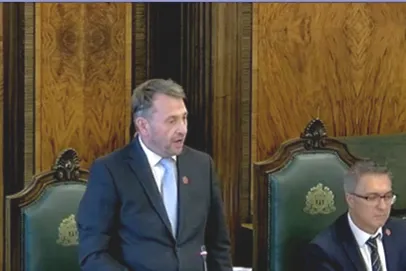Lancashire CC’s Reform UK leader has criticised the council for taking on multi-million pound investments, some of which will not mature until the next century.
Speaking at full council last Thursday, Stephen Atkinson (Ref), who became leader following May’s elections, said the figures had been uncovered as part of an “efficiency review of the council’s financial management”.
He said: “With the external help of Reform UK colleagues we have been able to ask questions about the councils assets and investments.
“During the term of the last council that started in May 2021 the council purchased government and corporate bonds, some that did not expire for up to 96 years, to a value of £436m.
“The latest market valuation at the 31 March this year, if they had to be sold, is that they would now be worth £156m, that’s a £280m reduction or 64%.”
Papers presented to the audit, risk and governance committee yesterday confirmed these figures were accurate, but noted the council was under no obligation to sell them at a loss.
They include £120m invested in the French company EDF and not due to mature until 2114 and £260m in government bonds due to mature in 2073.
It said the investments had been made between August 2021 and April 2022 and at the time represented a good return. The EDF bonds offered yields of around 3% when the interest rates were closer to 0.5% and “not expected to increase significantly”.
The council has a net revenue budget of £1.2bn for 2025-26. Its total investment portfolio of £557m generated £33.6m in income in 2024-25, an average return of 3.25%. However, papers said this was less than the sterling overnight rate of 4.9% used as a benchmark for investment returns.
The report says: “This is a complex position for the council. Its investment portfolio has historically produced good return but current market conditions have meant these returns are likely to remain low for the foreseeable future as interest rates remain high.”
Addressing the council, in comments that have since been shared by Reform on social media, Cllr Atkinson criticised the investment in a “foreign company”.
He acknowledged the losses would only be incurred if the bonds were sold off early but said this was “highly likely given the expiration dates of 2117, 2114, 2073, 2063 and 2060”.
Aidy Riggot (Con), cabinet member for economic development under the previous Conservative administration, told the meeting he had not known about the investments.
“I too was surprised to discover this … I knew nothing about this matter, the value of these bonds or the situation the council faced until these reports were published on Friday.”
He said he had asked the chief executive Mark Wynn – who was appointed in February this year after joining the council as executive director of resources in 2023 – to confirm whether they were in line with the treasury management policy at the time.
However, other opposition councillors hit back at Cllr Atkinson, claiming there was no need to sell the investments at a loss and accusing him of scaremongering.
Gina Dowding (Green) said: “Let’s not scaremonger the people of Lancashire by quoting figures when from my understanding we are not in a too bad a position at all when compared to our assets.”
John Potter (Lib Dem) accused the Reform administration of struggling to live up to its “rhetoric” during the election campaign earlier this year.
He said: “They are saying Lancashire is broken. They also confused capital spending with debt. Are you going to say to anyone that wants a new school in my patch ‘you are not going to get that school because we have cut the capital funding?’”
Azhar Ali (Progressive Lancashire Group) added: “This is what this is about: you’re trying to cover your backsides for promises made in an election campaign that you can’t possibly fulfil.”
The council declined to comment further when contacted by LGC. However, papers presented to the audit, risk and governance committee said the council’s “executive leadership team has kept the overall [investment] position under review since 2023 and has taken steps to strengthen the governance, decision making and monitoring arrangements of the treasury management strategy”.
This includes requiring investments of £10m or more to be approved jointly by the director of investments and the director of finance and limits on the terms of new investments.
The treasury management strategy for 2025-26, approved in February this year, also said given the expected decrease in interest rates, “the council would seek to minimise borrowing and therefore would no longer look to hold investments equal to reserves, and will utilise surplus cash to minimise borrowing”.
This is a change to the strategy introduced in 2010-11 which had been to borrow fully to finance its capital programme and invest its reserves and balances to earn interest to offset these costs.
The council estimates it has reduced its potential borrowing costs between 2015 and 2025 by £130m when compared to using its reserves to fund capital investment.

